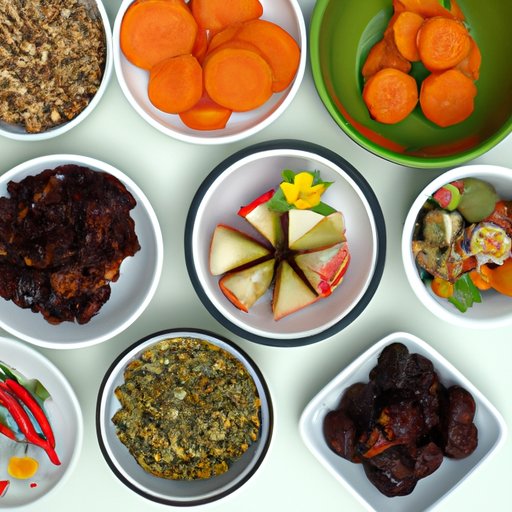
I. Introduction
Over the last few years, plant-based diets have gained immense popularity, with more people adopting them as a solution to their health problems and as a way to reduce their carbon footprint. Not only is it an effective way to control weight, but it is also a healthy and sustainable option. In this article, we will discuss how a plant-based diet works and why you should consider making the switch.
II. The Science & Benefits Behind a Plant-Based Diet
Various scientific studies have shown that a plant-based diet is healthier than most other diets. The benefits of this diet are numerous, including reduced rates of heart disease, diabetes, high blood pressure, and cancer. A plant-based diet is also known to improve gut health and digestion. These benefits are due to the high fiber, vitamin, and mineral content of plant-based foods.
The diet focuses on foods like fruits, vegetables, whole grains, nuts, and seeds, which are rich in essential nutrients. A plant-based diet also excludes animal products such as meat, dairy, and eggs, which are high in saturated fats and calories. This exclusion is a significant reason why a plant-based diet helps reduce the risk of chronic diseases.
III. What You Should Know Before Switching to a Plant-Based Diet
If you’re considering switching to a plant-based diet, there are a few things you should know before making the jump. First, you need to understand what to eat and what to avoid. Avoiding animal products entirely can be daunting, so making gradual changes is a good start. You also need to be aware of nutrient deficiencies that may arise from cutting out meat entirely.
Some tips for shopping and meal prepping on a plant-based diet include buying seasonal produce, stocking up on supplies, and cooking in bulk. Socializing while following a plant-based diet can also be challenging. Strategies for navigating such situations include bringing your food, eating beforehand, or looking out for restaurants offering plant-based options.
IV. Real Life Success Stories: How Going Plant-Based Changed My Health
Switching to a plant-based diet has changed the lives of many individuals worldwide. Anecdotal accounts of these individuals support the notion of how powerful a plant-based diet can be. They have shared their stories regarding the health benefits they have experienced such as weight loss, reduced inflammation, and clear skin. Other people have experienced a sizable increase in energy and mental clarity.
V. Plant-Based for the Environment: How Your Diet Choices Can Make a Difference
Plant-based diets are not just beneficial for our bodies, but they also protect the environment. Meat production has an enormous carbon footprint. A diet that includes meat can consume seven times more water compared to a plant-based diet. By eating plant-based, you directly reduce greenhouse gas emissions, pollution, and land use. Besides, as the planet’s population continues to increase, plant-based eating can help in feeding more individuals sustainably.
VI. Top 10 Plant-Based Swaps for Meat-Lovers
Transitioning to a plant-based diet can be challenging for meat lovers. However, with a little creativity, it is possible to create delicious plant-based meals. The following are ten easy-to-adopt tips that you can use:
- Swap ground beef for lentils or mushrooms.
- Use chickpeas or tofu in place of chicken in curries and stir-fries.
- Replace cheese with nutritional yeast or vegan cheese alternatives.
- Try tempeh bacon instead of traditional bacon.
- Use cashews to make creamy sauces and dressings.
- Replace dairy milk with almond, soy, or oat milk.
- Use avocado to create a creamy texture in dips and sauces.
- Swap beef burgers for black bean or veggie burgers.
- Use jackfruit instead of pulled pork.
- Try using cauliflower as a meat substitute in dishes like buffalo cauliflower wings.
VII. Plant-Based vs. Vegan: What’s The Difference?
Many people use the terms ‘plant-based’ and ‘vegan’ interchangeably. While the diets may overlap, they are not the same. A vegan diet typically excludes all animal products, including clothing, beauty products, and animal entertainment. A plant-based diet, on the other hand, focuses solely on food choices and excludes animal-based foods. A vegan lifestyle is also based on ethical and environmental considerations.
VIII. Conclusion
A plant-based diet is a sustainable and healthy eating option that has proven benefits to our bodies and the environment. Switching to this diet can be an effective way to manage chronic conditions, promote a longer life, and reduce our carbon footprint. With the right information and support, anyone can make a successful switch to a plant-based diet.





